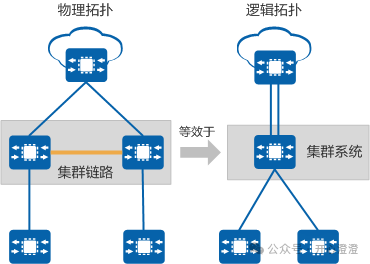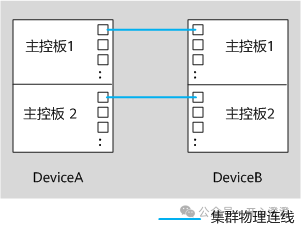华为S8700交换机配置指南-主控板堆叠
集群简介
定义
集群(也称集群系统,CSS),是指将两台设备通过线缆连接在一起,从逻辑上变成一台设备,作为一个整体参与数据转发,如图1-3所示。
图1-3 集群示意图

举例:组建集群(主控板连线)
组网需求
如图2-27所示,DeviceA和DeviceB两台S8700-6采取集群组网,达到网络结构简单,易于配置和管理的目的。
图2-27 组建集群组网图

本例中interface1,interface2分别代表10GE5/0/1,10GE6/0/1。

配置思路
采用如下的思路配置:
- 提前规划好集群方案。
- 按照前期的规划,连接好DeviceA和DeviceB之间的集群线缆。
- 在DeviceA和DeviceB上进行集群配置,包括集群参数(集群ID、集群优先级、集群域编号)及Stack-Port端口。
- 保存DeviceA和DeviceB的配置,并开启集群功能。
- 检查集群组建是否成功。
操作步骤
提前规划集群方案。
- 规划DeviceA的集群ID为1,DeviceB的集群ID为2。
- 规划DeviceA作为主设备,其集群优先级最高,为150。DeviceB的集群优先级为100。
- DeviceA和DeviceB使用主控板上10GE接口进行集群转发链路的连接,用于连接的端口均为10GE5/0/1,10GE6/0/1。
连接集群线缆。
如图1-28所示,按照前期规划连接DeviceA和DeviceB之间的集群线缆。
图1-28 集群连接示意图
 3. 配置集群参数。
3. 配置集群参数。
# 配置DeviceA的集群ID为1,优先级为150。
<HUAWEI> system-view
[HUAWEI] sysname DeviceA
[DeviceA] css
[DeviceA-css] css member 1
[DeviceA-css] css priority 150
[DeviceA-css] quit
# 配置DeviceB的集群ID为2,优先级为100。
<HUAWEI> system-view
[HUAWEI] sysname DeviceB
[DeviceB] css
[DeviceB-css] css member 2
[DeviceB-css] css priority 100
[DeviceB-css] quit
4. 配置Stack-Port端口。
# 建议在配置Stack-Port端口前,手动备份当前配置文件。
# 建议在配置Stack-Port端口前,先shutdown待加入的成员端口,避免端口因产生CRC错包而导致Error-Down。配置过程省略。
# 在DeviceA上创建Stack-Port端口,将成员端口加入Stack-Port端口。
[DeviceA] interface stack-port 1
[DeviceA-Stack-Port1] port member-group interface 10ge 5/0/1 10ge 6/0/1
[DeviceA-Stack-Port1] quit
[DeviceA] quit
# 在DeviceB上创建Stack-Port端口,将成员端口加入Stack-Port端口。
[DeviceB] interface stack-port 1
[DeviceB-Stack-Port1] port member-group interface 10ge 5/0/1 10ge 6/0/1
[DeviceB-Stack-Port1] quit
[DeviceB] quit
# undo shutdown之前被关闭的成员端口,配置过程省略。5. 检查集群配置信息。
# 上述配置完成后,执行命令display css configuration查看配置是否与规划的一致,如果不一致,需要修改配置。以查看DeviceA为例。
<DeviceA> display css configuration
Oper : Operation
Conf : Configuration
LC : LineCard
* : Offline configuration
Attribute Configuration:
MemberID Domain Priority Mode Enable DelayTime PriorityFirst
Oper(Conf) Oper(Conf) Oper(Conf) Oper(Conf) Oper Oper(Conf) Oper
1(1) 10(10) 100(150) LC(LC) Disable 0(0) N
Stack-Port Configuration:
Stack-Port Member Ports
Stack-Port1 10GE5/0/1 10GE6/0/1
CSS-Global Configuration:
- AuthMode Password
- -
6. 保存配置并开启设备集群功能。
# 保存DeviceA的配置并开启集群功能。建议先开启规划为主设备的DeviceA的集群功能。这样DeviceA可以先完成重启,从而优先成为主设备。
<DeviceA> save
Warning: The current configuration will be written to the device. Continue? [Y/N]: y
<DeviceA> system-view
[DeviceA] css
[DeviceA-css] css enable
Make sure that one or more dual-active detection methods are configured once the conversion is complete and the device enters the CSS or stack mode.Switches working in different forward modes cannot set up a CSS or stack.
Current configuration will be converted to the next startup saved-configuration file of CSS or stack mode.
System will reboot. Continue? [Y/N]: y
开启集群功能后,设备会自动重启。
# 保存DeviceB的配置并开启集群功能。
<DeviceB> save
Warning: The current configuration will be written to the device. Continue? [Y/N]: y
<DeviceB> system-view
[DeviceB] css
[DeviceB-css] css enable
Make sure that one or more dual-active detection methods are configured once the conversion is complete and the device enters the CSS or stack mode.Switches working in different forward modes cannot set up a CSS or stack.
Current configuration will be converted to the next startup saved-configuration file of CSS or stack mode.
System will reboot. Continue? [Y/N]: y
7. 检查集群是否组建成功。
# 通过Console口或管理网口登录集群系统,使用命令display css查看集群是否组建成功。当通过管理网口登录时,需要使用主设备的IP地址。
<DeviceA> display css
MemberID Role MAC Priority DeviceType Description
1 Master 00e0-fc12-3456 150 S8700-6
2 Standby 00e0-fc12-3478 100 S8700-6
如上所示,显示两台设备的信息,表示集群建立成功,且主设备为成员ID为1的设备,即DeviceA。
# 查看集群的拓扑信息是否与集群连线一致。
<DeviceA> display css topology
CSS Topology:
Stack-Port 1
MemberID Status Neighbor
up 2
2 up 1
CSS Link:
Stack-Port Port Protocol PeerPort PeerProtocol
Stack-Port1/1 10GE1/5/0/1 up 10GE2/5/0/1 up
Stack-Port1/1 10GE1/6/0/1 up 10GE2/6/0/1 up
Stack-Port2/1 10GE2/5/0/1 up 10GE1/5/0/1 up
Stack-Port2/1 10GE2/6/0/1 up 10GE1/6/0/1 up
如上所示,拓扑信息与集群连线一致,表示所有集群链路均建立成功,无异常链路。